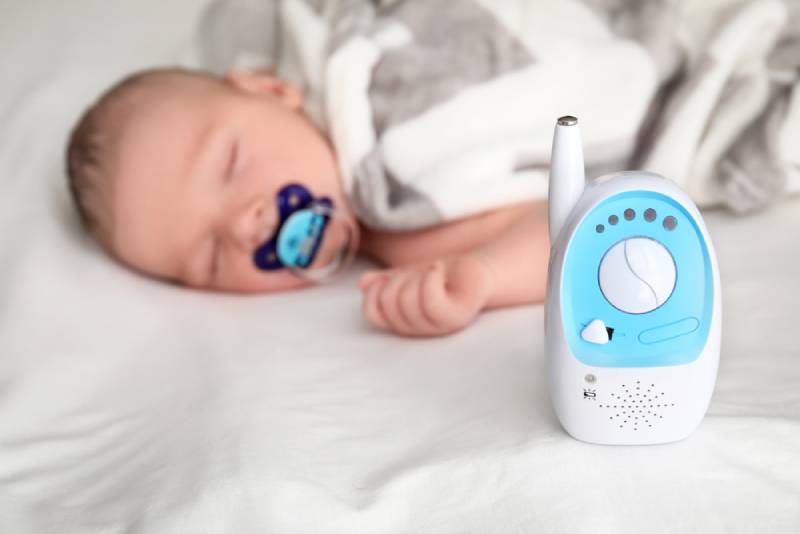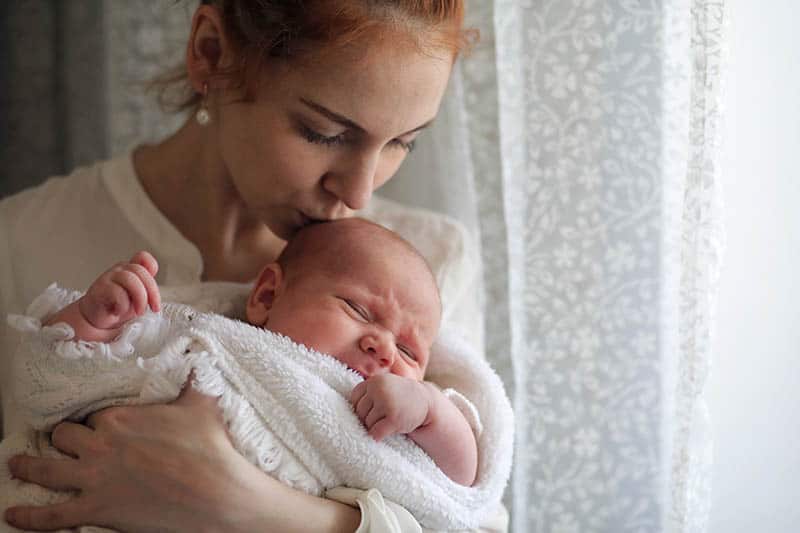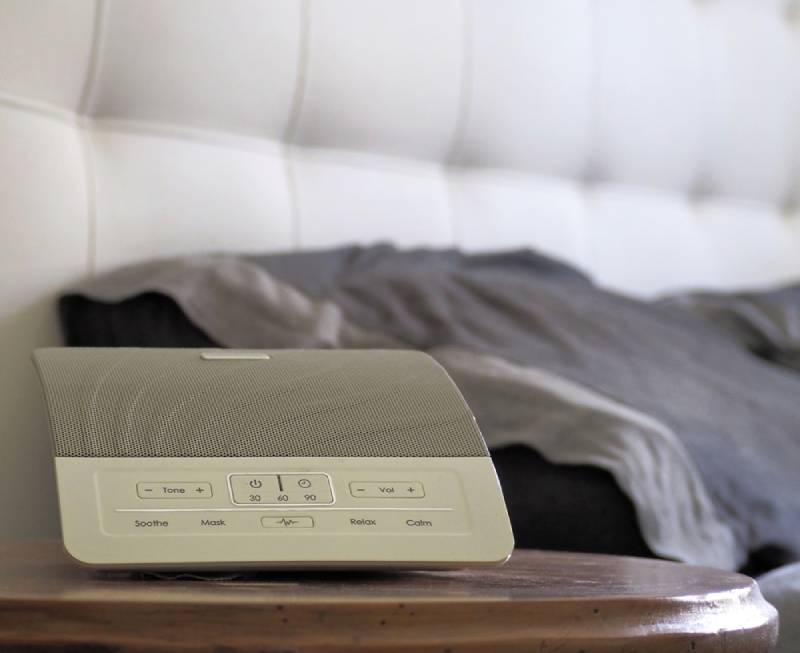Everybody talks about how great it is to have a baby and how it’s the most wonderful period of every woman’s life. However, no one mentions those not so great parts of it – like when your baby wakes up every hour crying and you just feel so helpless.
Developmental milestones, infections or other health issues, teething, hunger…These are all possible reasons why your baby wakes up every hour.
I know that this is the worst phase for all parents because we feel so powerless when we can’t help our little one. You try to do everything you can to help them and put them back to sleep, but nothing helps.
Parents spend so many sleepless nights worrying about their crying baby who is suffering from sleep deprivation and wakes up too early.
No matter what you do and how hard you try, sometimes it feels like a mission impossible to get your baby to sleep for longer stretches at night.
The worst part is that it might become a habit for them and they might continue to wake up every hour for a long time. That’s when a real problem arises.
Newborn baby sleep problems affect parents greatly. It impacts their mental health and their social life also.
If you are a parent of a baby who wakes up in the middle of the night and just won’t go back to sleep again, you should look for some sleep training options immediately.
Why does the baby wake up every hour?
You feel so powerless when you don’t know how to help your baby who wakes up every hour during the night.
First of all, you need to learn about and understand the reasons why your baby doesn’t settle down for a long stretch of sleep at night.
1. You haven’t established an appropriate bedtime routine

You need to create a baby sleep schedule for your baby and make it your bedtime routine.
However, you should wait until the baby is at least 4 months old to start this self-soothing training.
Give your baby some time to adjust to the new sleeping pattern. Also, around this time, you’ll likely encounter the 4-month sleep regression.
Don’t stress though, it’s nothing to worry about.
It’s going to be difficult and you won’t sleep for a few weeks but you’ll survive it as we all did because we moms are superheroes.
Almost all babies experience it. It’s actually how they respond to new sleep habits and an increased awareness of their surroundings.
First of all, you need to decide when the appropriate time to put your baby to sleep is.
Keep in mind that it’s very important to put your baby to sleep early. It should be approximately two hours after their last nap ends.
In addition, make sure to always follow your pre-sleep routine.
Whether it’s taking a bath, swaddling, cuddling, reading to your baby, listening to some gentle music, or feeding, you should stick to your routine.
It’s how your baby will know that it’s time for sleep.
2. They’re probably hungry

If your baby wakes every hour at night there is a good chance they are hungry.
How much you should feed your baby at night depends on how old the baby is – so make sure you read and learn about feeding your baby.
For example, you have to understand that your baby’s tummy is small and therefore can’t hold too much. Plus, breast milk is very easy to digest.
Many mothers ask why babies who breastfeed wake up more often through the night than babies that are formula fed. Well, now you know the answer.
I know that it’s not easy to wake up every hour to feed a crying baby, but you should keep in mind that it’s only a phase and that it’ll pass sooner than you think.
3. Baby is used to falling asleep with a pacifier or a bottle

There are pros and cons to giving your baby a pacifier.
One of the cons is that your baby may get used to it and every time the pacifier falls out of their mouth they start crying and wake up.
Most babies are addicted to sucking and need to suck something before nap time and bedtime. So, if they lose their pacifier or it falls out of their mouth, they instantly wake up.
If you notice that this is the reason why your baby wakes up every hour, you should try to break the habit and get rid of the pacifier.
The first few days, they’ll cry because they’ll miss it. But after some time, they’ll get used to it and enjoy better nighttime sleep.
4. Growth spurts

This is something you should be expecting and you should prepare yourself for.
In the first year, your little one will go through many growth spurts. Sometimes it’ll affect the feeding, sometimes it’ll affect their mood and their sleep, and sometimes it’ll affect everything.
Those growth spurts last about 2-3 days but can also last up to a whole week.
You should also be prepared and expect that your sleep training and the bedtime routine won’t work then.
Baby will wake up every hour and night feeding will be more frequent and longer. It’s possible that the baby won’t be hungry at all, but will be seeking your comfort through breastfeeding.
5. Teething

There is no doubt that teething is one of the most common reasons why our little ones wake up every hour.
You can expect this to happen at around 6 months of age but it’s not unusual for it to happen even earlier.
It’s also a new sensation for babies so that’s when they’ll be the most cranky and fussy. They’ll want to be by your side 24/7 because they need your comfort.
It’ll also make you feel awful because you’ll be constantly asking yourself if it is really teething and whether those teeth are coming up or not.
And most of all, you’ll feel powerless because you can do nothing to help your baby, save for a few remedies for teething.
If your baby is chewing his tongue or chewing on everything in sight, drooling, rubbing her ears, or has a mild temperature or diarrhea, or if your baby is refusing to eat or has a rash around the mouth, then there is a good chance your baby is teething and that’s the reason for her disrupted sleep.
6. Digestive issues

If your baby is fussing and wiggling around, it’s a clear sign that your baby has some digestive issues. If her tummy hurts, then it’s no wonder your little one wakes up frequently during the night.
The best way you can do to help your little baby is keep breastfeeding. As I have already said, sucking calms young babies down, and knowing that you’re close is comforting to them.
If your baby is refusing to eat, then you should carry them. Give them a pacifier and swaddle them. This will also serve as a great tummy massage for them.
If that also doesn’t help, you should lay your baby on their tummy. It will also calm them. However, it’s important to place them on their back when you want to put them back to sleep.
Babies should never sleep face down.
The next solution for your baby’s digestive issues is massage.
You can ask your midwife to demonstrate infant massage to you, or you can look for it online and try to calm your baby with an abdominal massage.
7. Sickness and infections

If nothing helps to put your baby back to sleep, then you should check their temperature or look for some other signs of an infection or illness.
Babies over six months have a tendency to put everything they find on the floor in their mouths. That’s how they expose themselves to germs and infections.
Unfortunately, you can’t do much about it.
You have to allow your baby to do that because that’s how they explore the world around them. Of course, always keep your eyes on them and keep small things and toys away from your baby.
If your baby is sick, you’ll definitely see some symptoms.
If you’re worried, you can call a professional or a midwife and explain the symptoms and they’ll advise you how to help your baby.
8. If they got overtired during the day, they’ll wake many times at night for sure

This is something that most parents do wrong.
Most of us think that if we don’t put our baby to sleep early, they’ll be overtired and it’ll be easier for them to sleep through the whole night.
Well, unfortunately this isn’t true. Overtired babies won’t be able to sleep normally. If your baby wakes up every hour throughout the night, believe it or not, they may be too tired to sleep.
You won’t be able to get them back to sleep for a certain amount of time, which will cause them to be more tired and the whole cycle of an overtired baby who just won’t go to sleep will continue.
That’s why it’s very important to notice the signs that your baby is ready for sleep and get them to bed early.
If you let your baby stay awake for longer than their little body can handle, the result will only be sleep deprivation and an overtired crying baby.
There are some obvious signs that your baby is overtired.
For example, they only take quick and brief naps in different places around the house, they’re cranky most of the time, or they can’t sleep for a certain amount of time during the night.
Also remember, sleep training is very hard to do with an overtired baby.
9. Their sleep pattern changes

After three months of age, babies develop circadian rhythms and they begin to have a regular sleep cycle.
Sleep patterns vary from baby to baby.
Some babies take quick naps during the day and sleep the whole night, while other babies have longer naps during the day and can’t sleep through the night. That day/night confusion can be a real problem.
Those sleep patterns will change as your baby grows older. The important thing is to get to know what your baby’s sleep pattern is.
The sleep pattern is the most similar in newborns. They still can’t sleep in long stretches because they need to be fed and changed every couple of hours.
After six months old, your little one will begin to sleep the whole night.
Their sleep pattern will be similar to yours.
Also, they’ll sleep cycle will change to longer stretches and deep sleep. As I’ve already said, it’ll become easier and you’ll finally get some sleep too.
10. Some big changes have happened in the baby’s environment

If you’ve moved or been on a trip and your baby wakes up every hour, you have nothing to worry about. The baby can sense some changes in her surroundings and this is how she responds.
Babies can feel change and it can make them feel uncomfortable.
Also, one of the reasons for those night wakings could be if you’ve moved the baby to their own room too soon.
If they wake up in the middle of the night and they realize that they’re alone in a room, they’ll start crying immediately.
It can create a much bigger problem for you. Babies have a fear of separation from their parents, especially their mother. If the baby gets scared one night, they probably won’t want to sleep without at least one parent by their side.
11. The fact is that some babies are “bad sleepers”

This is a fact and all you can do is accept it and be strong. Of course, you can try sleep training and you may see some results, but nothing will completely help.
We all wake up a few times at night but we don’t remember it because we fall back asleep immediately. Babies don’t know how to fall back asleep by themselves.
If they don’t sleep with their parents, or at least if their crib isn’t right by their bed, the baby will be scared and will start crying instantly.
They need to feel your touch or at least hear your voice so they know that you are there.
Solutions for when your baby wakes up every hour
You no longer need to be depressed about your baby’s sleep deprivation because I have great news for you.
There is a way you can make an appropriate sleep plan for your baby and get them to sleep in a long stretch at night.
Here are some tips to help you.
1. Follow your instincts

It’s okay to listen to other people’s advice but you should always follow your own instincts and do what you think is best. After all, you know your baby better than anyone.
Just as all humans are different, little babies are different too. What helped one mother with her baby won’t necessarily help you and your little one.
All babies have different needs and issues. Also, your bedtime routine and sleep training methods are probably different from others.
2. Make a sleep plan and try to stick to it as much as possible

You should establish a bedtime routine and follow it every time you put your baby to sleep.
Napping is also part of the plan. Take note of how many naps your baby has during the day and how long they last.
Like I’ve said, the baby should go to sleep approximately two hours after their last nap ends (this doesn’t refer to a newborn baby).
I know that sometimes it is difficult to follow a sleep plan because something happens (teething or baby gets sick) and disrupts it all.
Even so, you should stick to your sleep schedule as much as you can and as soon as those issues end, continue with your routine.
That’s the only way you’ll teach your baby to fall asleep, and stay asleep for most of the night.
3. Break some unnecessary sleep associations

First I want to clarify something, not all sleep associations are bad. That’s why I advise you to break only the unnecessary ones.
That’s how you’ll teach your baby to self-soothe.
The first one you should immediately stop doing is rocking or bouncing your baby to sleep.
It’s not necessary because there are other ways to put your baby to sleep and you’re only making it a habit for your little one.
The other sleep associations you should stop are driving your baby around in the car or pushing them in the stroller so they fall asleep easier.
Try to teach your little one to fall asleep on their own. There is no need to pick them up every time they cry.
Give your baby a pacifier, play some white noise, check the room temperature (it should be between 68 to 72 degrees F), sing them a lullaby and that should be enough to get them to sleep.
And always make sure to properly dress your baby for sleep. If you’re wondering how to keep baby warm at night, just listen to your body and dress your little one equally. Babies shouldn’t be too hot or too cold while sleeping.
4. Massage your baby

Learning some infant massage techniques will always be helpful to get your baby to fall asleep easier.
Also, the massage will relax them and they’ll have a better sleep.
You can learn it even while you’re pregnant because that’s when you’ll probably have more time on your hands.
5. Use some white noise at bedtime

Consider the white noise as a kind of meditation for your baby.
It really relaxes them and it can also ease their pain when they’re sick or teething.
There are so many benefits to it. Ask your pediatrician and you’ll see that they’ll also recommend that you play your baby some white noise before bedtime.
Please, give it a try.
6. Cuddle with them

Your baby needs to feel that they are safe and protected and that’s why they want to be by your side most of the day.
They need comfort, especially if something is bothering them.
By cuddling with your baby before bedtime you’ll make them feel safe and you’ll also get them tired enough to fall asleep faster.
7. Don’t be afraid to try co-sleeping

I know that most parents are afraid of co-sleeping because they think that the baby will want to do it every night and a habit will end up being formed.
It doesn’t have to be like that. I’m not saying that you have to do it every night, but in those moments, when it’s obvious that your baby is in pain or going through some phase, you may have no other option.
8. Ask your partner and your family to help you

You don’t have to go through all of this alone.
Breastfeeding and not getting enough sleep is exhausting for mothers and they need all the help they can get.
9. Dream feed your baby

Maybe you have never heard of this, or maybe you’ve run out of options and have considered this already.
There is nothing wrong with feeding your baby while they are still dreaming.
It’s actually how you’re going to help your little one to sleep better through the whole night.
My recommendation is to do it before you go to bed because they may sleep a longer stretch at night and you’ll also be able to get some sleep.
It’s actually very easy. You feed your baby without waking them up. Dream feeding is the best option both for you and for your baby to get some rest.
10. As soon as you put your baby to sleep, you should fall asleep too

You need to adjust to your baby’s needs. And if you want to get some sleep, you should go to bed every time you put your baby to sleep.
Leave everything because nothing is as important as your baby or your health.
Try to go to bed as early as you can because even with the sleep training, your baby won’t immediately learn to sleep through the whole night.
11. You can always seek help from a sleep consultant

If you have tried all of the above and nothing has helped to get your baby back to sleep or to help them to sleep all night (especially if we’re talking about a 6-12 month old baby), then you should call a sleep consultant and ask them for help.
I know that this is a hard part of having a baby. When baby wakes up every hour, it is so exhausting both for you and for the baby.
However, keep in mind that this is only a phase and it’ll pass sooner than you think. No matter what anyone else says, you have to know that you’re doing a great job.
Keep it that way. I hope this has helped you and you’ll listen to my advice. I hope both you and your baby will have a good night’s sleep.
I’m sending many virtual hugs to all moms out there who are dealing with these issues. Being a mom is hard work.
I’m rooting for you because I know you can do this – remember you are a real-life superhero.
READ NEXT: 14 Best Baby Projectors And Soothers For Relaxing Sleep
Like this post? Please share or pin it for later. You can also stay in the loop and follow us on Facebook, Instagram and Pinterest.

This post contains affiliate links. Please see our full disclosure or more info.

